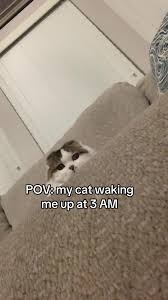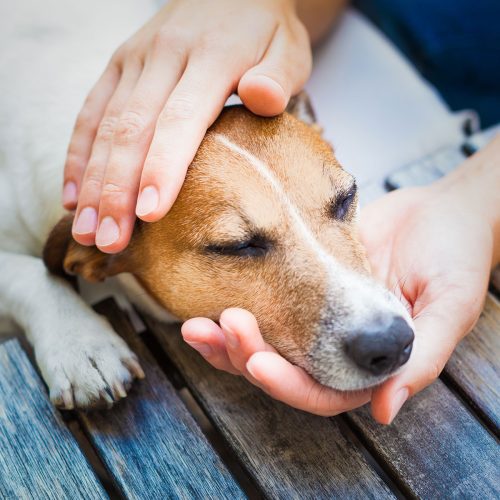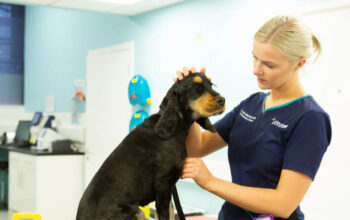If you’re reading this, chances are you’ve been jolted out of sleep — again — by paws padding around your room, a loud meow in your ear, or a wet nose pressed against your face at exactly 3 AM.
Don’t worry, you’re not alone. In fact, 3 AM seems to be the international pet standard time for “wake up, human!”
But why does it happen? Why do our furry friends suddenly get active, restless, or loud right when we’re deep in dreamland?
Let’s talk about it, because once you understand what’s happening, you’ll realize your dog or cat isn’t trying to torment you. They’re just… being themselves.
1) Their Natural Internal Clock Is Different From Yours
You know how we humans have a sleep-wake cycle based on daytime and nighttime routines?
Well, animals have theirs too — and their version doesn’t necessarily care about your alarm clock.
Cats, especially, are crepuscular
This means they’re naturally most active at dawn and dusk.
So around 3–5 AM, your cat’s brain might be telling them:
- “Wow, it’s hunting time!”
- “Let’s zoom across the bed!”
- “Wake up human, it’s breakfast o’clock!”
Dogs, on the other hand, follow human routines but still react to noises
A dog might sense something minor — like a neighbor moving around — and feel the need to alert you. Yes, even at 3 AM.
Read Also: Behavioral Problems: Why Dogs Bark at Night & What Can Be Done
2) Hunger & Routine Conditioning
Pets learn your patterns.
If you’ve ever fed your dog or cat early in the morning, even once, trust me — they have NOT forgotten.
If breakfast is normally around 6 or 7 AM, your pet might start nudging you at 3 or 4 AM because:
- their stomach is awake
- their internal clock thinks it’s nearly morning
- they want to secure their spot for early food
3) Boredom or Lack of Daytime Stimulation by
If your dog or cat sleeps all day, guess what?
They’ll be fully recharged at night.
Cats nap up to 16 hours a day. Dogs nap too, especially when alone.
If they don’t burn enough energy during the day, the extra energy will show up at 3 AM.
Restless pet = restless owner.
4) They Heard Something You Didn’t
Animals have super hearing.
At 3 AM, your pet might be reacting to:
- insects or rodents
- distant barking
- the fridge making a noise
- wind blowing
- footsteps outside
- any tiny sound that you slept through
Cats go into “hunting mode.”
Dogs go into “protector mode.”
Either way… you wake up.
5) Anxiety or Stress
Your pet might be waking you because they’re anxious or uncomfortable.
Triggers can include:
- thunderstorms
- strange noises
- new environment
- separation anxiety
- routine changes
- new pets or people
If they wake you and stay close, they’re probably seeking comfort.
6) Health Issues You Shouldn’t Ignore
Sometimes the 3 AM wake-up is a sign of discomfort or illness.
Dogs may wake up due to:
- bladder infections
- needing to pee more
- pain
- digestive upset
- age-related confusion
- itching or fleas
Cats may wake up due to:
- hyperthyroidism
- kidney issues
- pain
- digestive discomfort
- cognitive decline
If the behavior is new or unusual, a vet check is important.
Read Also: Raw vs Processed vs Freeze-Dried Foods: What’s Best (and Safest) for Your Pet?
7) Temperature Changes
If the room is too hot, too cold, or drafty, pets get uncomfortable.
Cats love warmth and will come looking for your heat.
Dogs might pace, whine, or try waking you to move or adjust.
8) A Habit You Accidentally Encouraged
Sometimes YOU trained your pet to wake you at 3 AM.
Not intentionally — but by reacting to their behavior.
Examples:
- You fed your cat when it meowed → now it meows daily.
- You opened the door when your dog whined → now it whines every night.
Animals repeat whatever works.
9) Their Sleep Cycles Reset Faster
Pets have shorter sleep cycles than humans and wake up more often at night.
When they wake, they may assume YOU are awake too… even though you’re fast asleep.
10) Territorial Instincts
Your home is your pet’s territory.
At night, things feel different:
- new smells
- faint sounds
- shadows
- movement outside
Your dog may bark or wake you as part of “protecting” the home.
Your cat may investigate, run around, or wake you for assistance.
What You Can Do About It
Good news: You CAN reduce or stop the 3 AM wake-up calls.
Here’s how:
1. Tire them out during the day
More play = deeper sleep.
2. Don’t reward the wake-up
Ignore the behavior (even though it’s hard).
3. Adjust feeding times
Feed their last meal later in the evening.
4. Keep a consistent routine
Pets LOVE structure.
5. Create a cozy sleep space
Warm, soft, comfortable areas help them stay put.
6. Check for medical issues
Especially if it starts suddenly.
7. Reduce nighttime noise
White noise machines help pets sleep better.
8. Add mental stimulation
Puzzle toys and interactive feeders work wonders.
Final Thoughts
If your dog or cat wakes you at 3 AM, it’s almost never because they’re misbehaving.
It’s usually because of:
- instinct
- hunger
- boredom
- anxiety
- habit
- environmental sounds
- or simple biology
Understanding why it happens makes it easier to fix.



